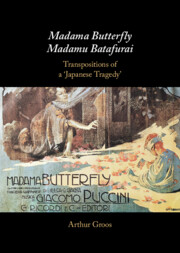
- Publisher:
- Cambridge University Press
- Online publication date:
- February 2023
- Print publication year:
- 2023
- Online ISBN:
- 9781009250696
- Subjects:
- Twentieth-Century and Contemporary Music, Music, Opera

Puccini's famous but controversial Madama Butterfly reflects a practice of 'temporary marriage' between Western men and Japanese women in nineteenth-century treaty ports. Groos' book identifies the plot's origin in an eye-witness account and traces its transmission via John Luther Long's short story and David Belasco's play. Archival sources, many unpublished, reveal how Puccini and his librettists imbued the opera with differing constructions of the action and its heroine. Groos's analysis suggests how they constructed a 'contemporary' music-drama with multiple possibilities for interpreting the misalliance between a callous American naval officer and an impoverished fifteen-year-old geisha, providing a more complex understanding of the heroine's presumed 'marriage'. As an orientalizing tragedy with a racially inflected representation of Cio-Cio-San, the opera became a lightning rod for identity politics in Japan, while also stimulating decolonizing transpositions into indigenous theatre traditions such as Bunraku puppet theatre and Takarazuka musicals.
‘This timely and exceptional study of Madama Butterfly provides a valuable, well-documented and illuminating account of the origins of the work and aspects of its reception in Japan. It is a meticulous exploration of the significance of this tragedia giapponese that will make a lasting contribution to Puccini studies.'
Naomi Matsumoto - Goldsmiths, University of London
‘This truly goundbreaking book sheds new and fascinating light not only on the conception and composition of Puccini's _Madama Butterfly_, but also on the Japanese origins of Madame Butterfly's story and the Japanese reception of the opera, which saw its notorious orientalism questioned and subverted through ingenious adaptation and creative re-appropriation. Groos makes us listen differently to a work we thought we knew all too well.'
Emanuele Senici - University of Rome La Sapienza
 Loading metrics...
Loading metrics...
* Views captured on Cambridge Core between #date#. This data will be updated every 24 hours.
Usage data cannot currently be displayed.